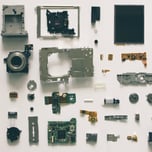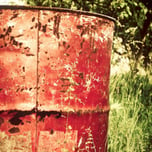- GreenMatch
- Blog
- Microplastic Pollution
Microplastics Threaten Our Environment
A Threat That Demands Fundamental Rethinking
Microplastic pollution has been a debated topic among environmentalists for many years. In early January, a comprehensive study revealed that microplastics are present in every part of the environment, classifying them as a global environmental problem and thereby bringing mainstream attention to this topic.
They are not a new type of plastic, but small fragments of plastics of any type. As we all know, it takes an enormous amount of time for plastic to decompose, however, external factors break plastic into smaller pieces, creating more substantial pollution.

If you would like to use this infographic on your website, use the embed code below:
How Are Microplastics Made?
- Primary microplastics
- Intentionally produced microplastics, like cosmetics such as face scrub, tooth paste, etc.
- Secondary microplastics
- Unintentionally created microplastics broken down from larger pieces of debris.
- Other sources of microplastics
- Accidentally created by human activity, e.g. released fibre from a shirt after washing.
Annual Microplastic Generation Around the World
- Africa: 0.13 million tonnes of microplastic waste produced annually.
- Asia: 0.23 million tonnes of microplastic waste produced annually.
- Europe: 0.24 million tonnes of microplastic waste produced annually.
- North America: 0.26 million tonnes of microplastic waste produced annually.
- Oceania: 0.23 million tonnes of microplastic waste produced annually.
- South America: 0.14million tonnes of microplastic waste produced annually.
Facts about Microplastics
- Their size
- These plastic particles are smaller than5mm.
- Silent killer
- Annually,100,000marine creatures die due to microplastic pollution.
- Annual production
- Approximately1.2 million tonnesof microplastic waste is generated annually.
- Impossible to clean
- The size of microplastics makes it almostimpossible to separatethem from water
- We eat them too
- As marine creatures have already been contaminated, after we consume them, microplastics alsoend up in our own bodies.
Findings of Studies
- Animals examined had, on average,5.5microplastic pieces in their guts.
- Plastic fibres, especially nylon, create60%of all microplastic waste.
- One plastic bottle will, over time, break down into10,000microplastic pieces.
- Microplastics absorb1 million timesmore toxic chemicals than the water around them.
Microplastic Cleanup Projects
- System 001 ‘Wilson’
- An artificial barrier ‘Wilson’, designed to collect plastics of theGreat Pacific Garbage Patch.
- PlastiCure’s PET Consuming Bacteria
- ModifiedPET consuming bacteria,which was introduced by PlastiCure, decompose plastics and release energy as a result.
- Recycling
- To prevent further issues, we need to focus more on recycling. So far,only 9%of the microplastic production has been recycled.
The Ocean Cleanup is a great initiative on how to begin cleaning the Great Pacific Garbage Patch which has been formed over time, due to our plastic waste. Nevertheless, because of the size of microplastics, it’s nearly impossible to remove them from water.
Salt water and UV exposure makes plastics release toxins faster, and additionally poisons oceans. A recent UK study revealed that plastics absorb 100 million times more chemicals than water.
Microplastic Waste Elimination
The first step towards a sustainable environment is becoming ‘waste aware’. By setting a recycling habit, we can lower our plastic waste generation and help preserve planet Earth for future generations.
In the United Kingdom after a ban on plastic straws arose, a restriction law on intentionally added microplastics had been introduced thanks to the ‘Environmental Protection (Microbeads) (England) Regulations 2017’. This piece of legislation forbids cosmetic manufacturers to intentionally add any microbeads to their products.
In order to make a greater difference, large-scale cleanup projects and raising awareness about the importance of recycling and waste management, have to come to the forefront of social discourse.
Recovering plastics from oceans and recycling them to create sustainable materials such as uPVC windows, is a step in the right direction. However, without reducing single-use and common plastic production, microplastic pollution will keep on growing rapidly and continue to poison our environment.
We strive to connect our customers with the right product and supplier. Would you like to be part of GreenMatch?





